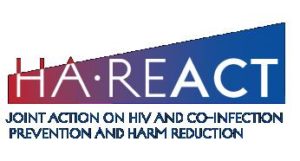
The Joint Action aims to contribute to the elimination of HIV and reductions of TB and viral hepatitis among PWID in the EU by 2020 and focuses on member states with gaps in effective and evidence-informed interventions. The project also encourages the implementation of comprehensive harm reduction programs in all EU member states as an essential strategy for improving the prevention and treatment of HIV, TB and viral hepatitis.
Here’s my interview with Prof Heino Stöver, steering committee member of HA-REACT, work package lead for “harm reduction and continuity of care in prisons,” and professor of social scientific addiction research at the Frankfurt University of Applied Sciences.

What influenced your decision to become involved with the newly formed Joint Action on HIV and Co-Infection Prevention and Harm Reduction (HA-REACT)?
Although European health policy has successfully raised general awareness of the threats of HIV and viral hepatitis B and C [HBV/HCV], the disproportionate infection rates and other health problems of prisoners remain a major challenge for all those working in the field. This threat is compounded in populations of prisoners who continue to use drugs while incarcerated and where harm reduction is unavailable. If left untreated, this population is highly vulnerable to acquiring additional infectious diseases and often suffers from other problems related to addiction, such as overdoses after release, abscesses, exposure to violence and psychosocial issues.
How do you see your role as lead on the “Harm reduction & continuity of care in prisons” work of the Joint Action?
Prison health is public health, so the situation is of crucial importance for the families, friends, and former prisoners in the community
My role is to gather all the relevant information in order to inform prison authorities and key stakeholders on the situation of the spread of infectious diseases in prisons and on the increased transmission risks and drug-related fatal overdose risks after release. Prison health is public health, so the situation is of crucial importance for the families, friends, and former prisoners in the community. We will also identify examples of good practice that are suitable to serve as guiding models for other prison healthcare services, jurisdictions in other countries, etc.
Why focus on HIV, TB and viral hepatitis in Europe?
We need a substantial evidence-based campaign to raise awareness and get key stakeholders on board
The focus on these infections and harm reduction in Europe is crucial to avoid long-term health problems for prisoners and challenges for healthcare delivery in municipalities. The earlier these infectious diseases are treated, the better the chances are of either eliminating them or suppressing their spread. There are convincing models showing the negative trends that will occur if nothing is done. We need a substantial evidence-based campaign to raise awareness and get key stakeholders on board.
What can we expect as a result of the work of HA-REACT?
The result will be to gather as much available information and publications on prison-based healthcare and harm reduction services in Europe as possible. Further, during the project, we will develop e-learning platforms as training modules on harm reduction, needle exchange and condom provision in prisons and opioid substitution programmes. Finally, we will provide a comprehensive overview on the situation of drug users in prisons and will publish on prison-based needle exchange.
What does HA-REACT’s work on prison health hope to achieve?
Over the next 3 years we hope to increase awareness of the situation of vulnerable people in prisons and of the necessity to deliver quality healthcare in prisons equivalent to the level delivered in the non-prison community. There are many barriers to be overcome in reaching this goal. However, there are also a number of good examples where harm reduction measures and more generally good health care services are working well. We will use HA-REACT to achieve cohesive European improvement.
Further Reading:
Lancet series from July 2016: HIV and related infections in prisoners
Press release:The Lancet: Mass imprisonment of drug users driving global epidemics of HIV, hepatitis, and tuberculosis
Prison-based needle and syringe programmes (PNSP) – Still highly controversial after all these years
Websites:
Frankfurt University of Applied Sciences Institute of Addiction Research
German organisation working on national harm reduction for drug users: Akzept e.V.
Further information about HA-REACT is available at: www.hareact.eu
Hepatology, Medicine and Policy is now accepting submissions on this and related issues. For more information, visit: www.hmap.biomedcentral.com.
We are hypocrites,
From the 90’s when I joined the Romanian prisons, I heard only about the relationship between prisons and public health, in various forms: as prisons concentrates infectious diseases, they are a favorable background for the spread of infectious diseases, that they are a epidemiological health pump outside the walls, they are even an epidemiological bomb (about TB and MDR-TB in prisons in some former Soviet countries).
And where are the facts? Is there a congruent consequence in the field of research? No!
Recently in the ecdc project on evidence based guidance in infectious diseases in prisons, most important result so far is that there are no studies or studies in fields are of low evidence.